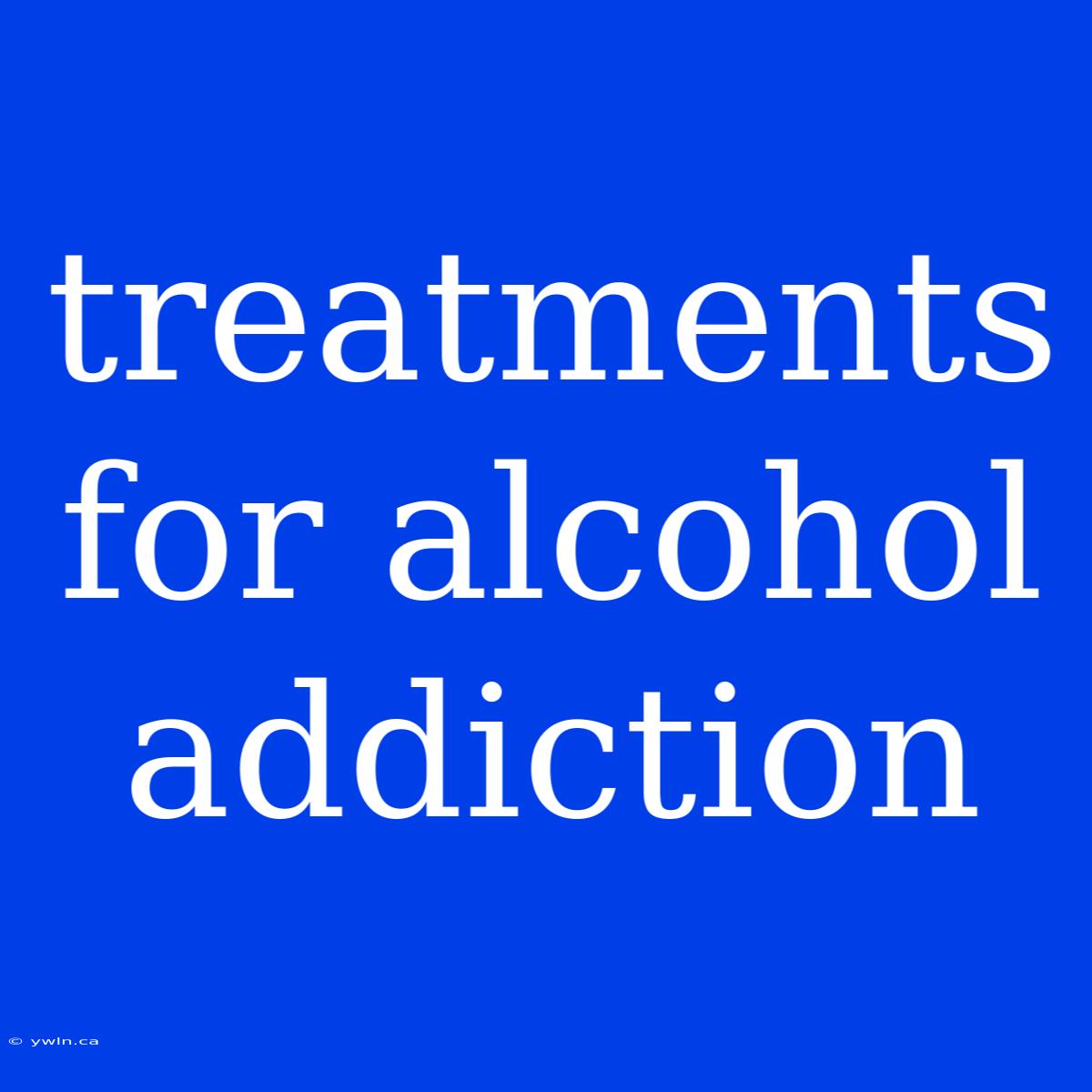Unlocking the Path to Sobriety: A Guide to Treatments for Alcohol Addiction
Alcohol addiction, a pervasive and complex issue, affects millions worldwide. The question arises: What are the available treatments, and how can they help individuals regain control over their lives? This article dives deep into the world of alcohol addiction treatments, offering a comprehensive understanding of the different approaches and their effectiveness.
Editor's Note: Alcohol addiction is a serious health concern, and seeking professional help is crucial. This article provides a deeper understanding of the available treatment options, empowering individuals to make informed decisions about their recovery journey. We will explore various therapies, medications, and support systems, highlighting their key aspects and benefits.
Analysis: We meticulously researched and analyzed various treatment modalities for alcohol addiction, drawing on medical literature, clinical guidelines, and expert opinions. The aim is to provide a clear and insightful guide for individuals seeking treatment or supporting loved ones battling addiction.
Key Takeaways:
| Treatment Modality | Key Aspects | Benefits |
|---|---|---|
| Behavioral Therapies | Cognitive Behavioral Therapy (CBT), Motivational Interviewing, Dialectical Behavior Therapy (DBT) | Address thoughts, behaviors, and coping skills |
| Medications | Naltrexone, Acamprosate, Disulfiram | Reduce cravings, manage withdrawal symptoms |
| Support Groups | Alcoholics Anonymous (AA), SMART Recovery | Peer support, shared experiences, accountability |
| Detoxification | Supervised withdrawal process | Manage withdrawal symptoms, prevent complications |
| Residential Treatment | Intensive therapy, structured environment | Comprehensive care, 24/7 support |
Understanding the Spectrum of Treatments
Behavioral Therapies
Introduction: Behavioral therapies are the cornerstone of alcohol addiction treatment, aiming to modify thoughts, behaviors, and coping mechanisms that contribute to substance use.
Key Aspects:
- Cognitive Behavioral Therapy (CBT): Identifies and challenges negative thought patterns and develops healthier coping strategies.
- Motivational Interviewing (MI): Encourages intrinsic motivation for change, empowering individuals to take ownership of their recovery.
- Dialectical Behavior Therapy (DBT): Focuses on emotional regulation, distress tolerance, and interpersonal skills.
Discussion: Behavioral therapies equip individuals with tools to manage cravings, prevent relapse, and build a life free from alcohol dependence. Through consistent application, these therapies can foster long-term recovery.
Medications
Introduction: Medications play a crucial role in alleviating withdrawal symptoms, reducing cravings, and preventing relapse.
Key Aspects:
- Naltrexone: Blocks the effects of alcohol, reducing cravings and the rewarding effects.
- Acamprosate: Helps maintain abstinence by reducing withdrawal symptoms and cravings.
- Disulfiram: Creates an unpleasant reaction if alcohol is consumed, discouraging further use.
Discussion: While medications are not a cure-all, they can significantly enhance treatment effectiveness when combined with behavioral therapies.
Support Groups
Introduction: Support groups provide a safe and supportive environment for individuals to connect with others who have shared experiences with alcohol addiction.
Key Aspects:
- Alcoholics Anonymous (AA): A 12-step program based on spiritual principles and peer support.
- SMART Recovery: A secular, self-help program focusing on cognitive and behavioral skills.
Discussion: Support groups offer a sense of belonging, accountability, and encouragement, fostering a sense of community during the recovery process.
Detoxification
Introduction: Detoxification is a medically supervised process that helps individuals safely withdraw from alcohol.
Key Aspects:
- Medications: Manage withdrawal symptoms and prevent complications.
- Monitoring: Vital signs and symptoms are closely monitored.
Discussion: Detoxification is a critical initial step in the recovery journey, allowing individuals to stabilize and prepare for further treatment.
Residential Treatment
Introduction: Residential treatment programs provide a structured and supportive environment for intensive therapy and recovery.
Key Aspects:
- Therapy: Individual and group therapy sessions.
- Support: 24/7 supervision and support.
Discussion: Residential treatment offers a comprehensive approach to recovery, fostering a holistic shift in mindset and behaviors.
FAQs about Alcohol Addiction Treatments
Introduction: This section addresses common questions about alcohol addiction treatments.
Questions:
- How long does alcohol addiction treatment last? The duration varies depending on the severity of addiction, individual needs, and treatment modality.
- Are alcohol addiction treatments covered by insurance? Coverage varies by insurance plan, but many plans offer coverage for addiction treatment.
- What if I relapse? Relapse is common, and it's essential to seek support and adjust the treatment plan if necessary.
- Can alcohol addiction be cured? Alcohol addiction is a chronic disease, but with proper treatment, individuals can achieve long-term recovery.
- What are the warning signs of alcohol addiction? Signs include cravings, withdrawal symptoms, tolerance changes, and impacts on social and professional life.
- Where can I find treatment for alcohol addiction? Start by consulting a healthcare professional, who can recommend appropriate resources.
Summary: Effective treatment for alcohol addiction involves a multi-faceted approach, including behavioral therapies, medications, support groups, and detoxification.
Closing Message: While the path to recovery can be challenging, numerous effective treatments exist to empower individuals to reclaim their lives. Seeking professional help and engaging in a treatment plan can lead to lasting sobriety and a fulfilling future.
Tips for Managing Alcohol Addiction
Introduction: These tips can support individuals seeking help or supporting loved ones battling addiction.
Tips:
- Seek professional help: Consult a doctor, therapist, or addiction specialist.
- Join a support group: Find a group that offers connection and accountability.
- Practice coping skills: Develop strategies to manage cravings and stress.
- Avoid triggers: Identify and minimize exposure to situations or people that trigger cravings.
- Focus on self-care: Prioritize physical and mental well-being.
- Stay connected: Build a supportive network of friends and family.
- Be patient and persistent: Recovery takes time and effort.
Summary: Alcohol addiction treatment is a journey that requires commitment and support. With the right resources and guidance, individuals can break free from the grip of addiction and build a healthier future.
Closing Message: Remember, seeking help is a sign of strength, not weakness. By seeking treatment and engaging in recovery, individuals can rediscover their lives and live fulfilling lives free from the control of alcohol addiction.

